 W
WAn Accidental Soldier is an Australian television drama film produced by Goalpost Pictures, released on 15 September 2013, and starring Marie Bunel, Dan Spielman, Julia Zemiro, and Bryan Brown. It is written by Blake Ayshford from the screenplay of John Charalambous, who based it on his 2008 book Silent Parts. The film was directed by Rachel Ward and was shot just outside Perth, Western Australia.
 W
WAll Quiet on the Western Front is a 1930 American epic pre-Code anti-war film based on the 1929 Erich Maria Remarque novel of the same name. Directed by Lewis Milestone, it stars Louis Wolheim, Lew Ayres, John Wray, Arnold Lucy and Ben Alexander.
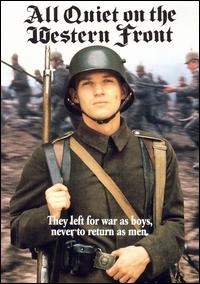 W
WAll Quiet on the Western Front is a television film produced by ITC Entertainment, released on November 14, 1979, starring Richard Thomas and Ernest Borgnine. It is based on the book of the same name by Erich Maria Remarque.
 W
WBlack and White in Color is an Ivorian 1976 war film and black comedy directed by Jean-Jacques Annaud in his directorial debut. It depicts French colonists at war with the Germans in Central Africa during World War I, and is set in the then German colony of Kamerun. The film adopts a strong antimilitaristic point of view, and is noteworthy for ridiculing the French side even more harshly than their German counterparts.
 W
WThe Dawn Patrol is a 1938 American war film, a remake of the pre-Code 1930 film of the same name. Both were based on the short story "The Flight Commander" by John Monk Saunders, an American writer said to have been haunted by his inability to get into combat as a flyer with the U.S. Air Service.
 W
WThe Four Horsemen of the Apocalypse is a 1921 American silent epic war film produced by Metro Pictures Corporation and directed by Rex Ingram. Based on the 1916 Spanish novel The Four Horsemen of the Apocalypse by Vicente Blasco Ibáñez, it was adapted for the screen by June Mathis. The film stars Pomeroy Cannon, Josef Swickard, Bridgetta Clark, Rudolph Valentino, Wallace Beery, and Alice Terry.
 W
WGallipoli is a 1981 Australian war drama film directed by Peter Weir and produced by Patricia Lovell and Robert Stigwood, starring Mel Gibson and Mark Lee, about several young men from rural Western Australia who enlist in the Australian Army during the First World War. They are sent to the peninsula of Gallipoli in the Ottoman Empire, where they take part in the Gallipoli Campaign. During the course of the movie, the young men slowly lose their innocence about the purpose of war. The climax of the movie occurs on the Anzac battlefield at Gallipoli and depicts the futile attack at the Battle of the Nek on 7 August 1915. It modifies events for dramatic purposes and contains a number of significant historical inaccuracies.
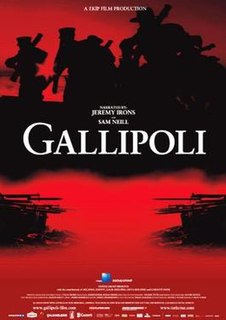 W
WGallipoli is a 2005 film by Turkish filmmaker Tolga Örnek. It is a documentary about the 1915 Gallipoli campaign, narrated by both sides, the Turks on one side and the British soldiers and Anzacs on the other side.
 W
WThe Girl and the General is a 1967 anti-war Italian comedy film starring Rod Steiger and Virna Lisi and produced by Carlo Ponti.
 W
WLa Grande Illusion is a 1937 French war film directed by Jean Renoir, who co-wrote the screenplay with Charles Spaak. The story concerns class relationships among a small group of French officers who are prisoners of war during World War I and are plotting an escape. The title of the film comes from the 1909 book The Great Illusion by British journalist Norman Angell, which argued that war is futile because of the common economic interests of all European nations. The perspective of the film is generously humanistic to its characters of various nationalities.
 W
WGreenery Will Bloom Again is a 2014 Italian anti-war film written and directed by Ermanno Olmi. Set in the trenches of the Asiago plateau, during World War I, it is loosely based on the short story La paura (1921), by Federico De Roberto. It was screened in the Berlinale Special section at the 65th Berlin International Film Festival. The film received eight nominations at the 2015 David di Donatello Awards, including best film and best director. This is the last film to have been written and directed by Ermanno Olmi, before his death in 2018.
 W
WHedd Wyn is a 1992 Welsh anti-war biopic, written by Alan Llwyd and directed by Paul Turner.
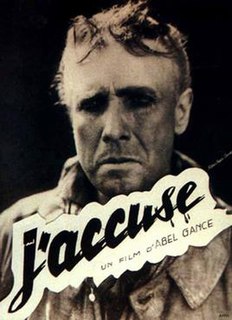 W
WJ'accuse is a 1919 French silent film directed by Abel Gance. It juxtaposes a romantic drama with the background of the horrors of World War I, and it is sometimes described as a pacifist or anti-war film. Work on the film began in 1918, and some scenes were filmed on real battlefields. The film's powerful depiction of wartime suffering, and particularly its climactic sequence of the "return of the dead", made it an international success, and confirmed Gance as one of the most important directors in Europe.
 W
WJohnny Got His Gun is a 1971 American drama anti-war film written and directed by Dalton Trumbo based on his 1939 novel of the same name, and starring Timothy Bottoms, Kathy Fields, Marsha Hunt, Jason Robards, Donald Sutherland and Diane Varsi. It was based on the novel of the same title by Trumbo, and features an uncredited writing collaboration by Luis Buñuel.
 W
WJoyeux Noël (''Merry Christmas'') is a 2005 epic war drama film based on the Christmas truce of December 1914, depicted through the eyes of French, Scottish, and German soldiers. It was written and directed by Christian Carion, and screened out of competition at the 2005 Cannes Film Festival.
 W
WKing and Country is a 1964 British war film directed by Joseph Losey, shot in black and white, and starring Dirk Bogarde and Tom Courtenay. The film was adapted for the screen by British screenwriter Evan Jones based on the play Hamp by John Wilson and a novel by James Lansdale Hodson.
 W
WKing of Hearts is a 1966 French comedy-drama film directed by Philippe de Broca and starring Alan Bates.
 W
WThe Lost Prince is a British television drama about the life of Prince John – youngest child of Britain's King George V and Queen Mary – who died at the age of 13 in 1919.
 W
WUomini contro is a 1970 Italo-Yugoslav anti war drama film directed by Francesco Rosi. It is based on the memoir by Emilio Lussu, Un anno sull'altipiano.
 W
WMaudite soit la guerre is a 1914 Belgian silent anti-war film directed and scripted by Alfred Machin, starring Baert. The film shows how war destroys love and friendship through the story of two friends obliged to fight each other as pilots in the Air Force of their respective (unnamed) countries. The film, released just before the beginning of World War I, is one of the oldest anti-war films ever made and includes a remarkable anticipation of aerial warfare.
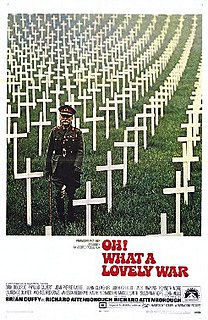 W
WOh! What a Lovely War is a 1969 British comedy and musical film directed by Richard Attenborough, with an ensemble cast, including Maggie Smith, Dirk Bogarde, John Gielgud, John Mills, Kenneth More, Laurence Olivier, Jack Hawkins, Corin Redgrave, Michael Redgrave, Vanessa Redgrave, Ralph Richardson, Ian Holm, Paul Shelley, Malcolm McFee, Jean-Pierre Cassel, Nanette Newman, Edward Fox, Susannah York, John Clements, Phyllis Calvert and Maurice Roëves.
 W
WPasschendaele is a 2008 Canadian war film, written, co-produced, directed by, and starring Paul Gross. The film, which was shot in Calgary, Alberta, Fort Macleod, Alberta, and in Belgium, focuses on the experiences of a Canadian soldier, Michael Dunne, at the Battle of Passchendaele, also known as the Third Battle of Ypres. The film had its premiere at the 2008 Toronto International Film Festival on September 4, 2008, when it also had the honour of opening the festival, and it was released widely in Canada on October 17, 2008.
 W
WPaths of Glory is a 1957 American anti-war film co-written and directed by Stanley Kubrick, based on the novel of the same name by Humphrey Cobb. Set during World War I, the film stars Kirk Douglas as Colonel Dax, the commanding officer of French soldiers who refuse to continue a suicidal attack, after which Dax attempts to defend them against a charge of cowardice in a court-martial.
 W
WThe Red Baron is a 2008 German-British biographical action war film written and directed by Nikolai Müllerschön about the World War I fighter pilot Manfred von Richthofen, known as the "Red Baron". The film stars Matthias Schweighöfer, Joseph Fiennes, Til Schweiger and Lena Headey. The Red Baron was filmed entirely in English to improve its international commercial viability.
 W
WRegeneration is a 1997 British film, an adaptation of the novel of the same name by Pat Barker. The film is directed by Gillies MacKinnon. It was released as Behind the Lines in the US in 1998. The film follows the stories of a number of Officers of the British Army during World War I who are brought together in Craiglockhart War Hospital where they are treated for various traumas. It features the story of Siegfried Sassoon, his open letter reprinted in The Times criticising the conduct of the war and his return to the front.
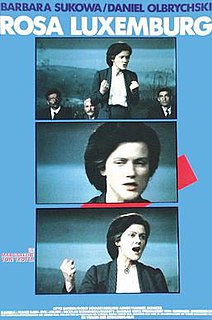 W
WRosa Luxemburg is a 1986 West German drama film directed by Margarethe von Trotta. The film received the 1986 German Film Award for Best Feature Film, and Barbara Sukowa won the Cannes Film Festival's Best Actress Award and the German Film Award for Best Actress for her performance as Rosa Luxemburg.
 W
WSignum Laudis is a 1980 Czechoslovak war drama film directed by Martin Hollý. It is set during World War I.
 W
WTestament of Youth is a 2014 British drama film based on the First World War memoir of the same name written by Vera Brittain. The film stars Alicia Vikander as Vera Brittain, an independent young woman who abandoned her studies at Somerville College, Oxford, to become a war nurse. The film was directed by James Kent and written by Juliette Towhidi.
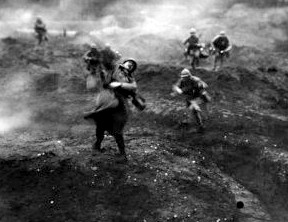 W
WVerdun: Visions of History is a 1928 French docudrama film directed by Léon Poirier. It portrays the battle of Verdun, primarily by recreating the battle on its location, but also with the use of newsreel footage and dramatic scenes. Most of the people in the film are actual French and German World War I veterans, including Marshal Philippe Pétain who portrays himself. The film has a pacifist message.
 W
WA Very Long Engagement is a 2004 French romantic war film, co-written and directed by Jean-Pierre Jeunet and starring Audrey Tautou. It is a fictional tale about a young woman's desperate search for her fiancé who might have been killed during World War I. It was based on the 1991 novel of the same name by Sébastien Japrisot.
 W
WWestfront 1918 is a German war film, set mostly in the trenches of the Western Front during World War I. It was directed in 1930 by G. W. Pabst, from a screenplay by Ladislaus Vajda based on the novel Vier von der Infanterie by Ernst Johannsen. The film shows the effect of the war on a group of infantrymen portrayed by an ensemble cast led by screen veterans Fritz Kampers and Gustav Diessl.